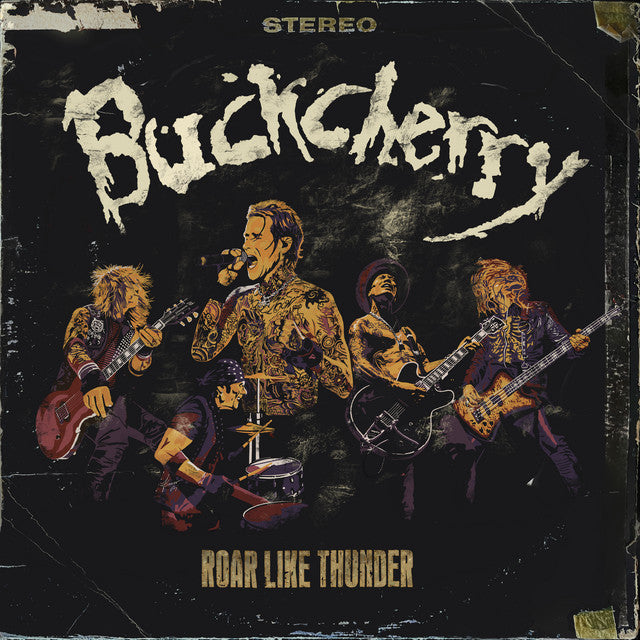
Buckcherry’s Roar Like Thunder aims to hit listeners with arena-sized force, but too often the album drifts into background territory instead of delivering the wild storm it promises. The title track kicks off with lightning-bolt vocals and a chorus that lives up to its thunderous name. The riffs are catchy and the vocals big and loud, but the verses feel bland and the guitars lack the dynamic edge you’d expect. The drums, while big and simple, become repetitive quickly, and the bass often gets lost in the mix. It’s a classic rock song that hits familiar notes but struggles to feel fresh or fully engaging.
“When The Sun Goes Down” adds some much-needed swing in the rhythm section, with drums that feel more dynamic and less repetitive. The vocals are clear and bold, and the riffs carry that familiar 90s/early 2000s alt-metal swagger. Still, the nostalgic vibe makes it feel more like a throwback than a step forward.
“Come On” takes the listener even further back, embracing a 70s hard rock sound with big drums and more audible bass. While the production quality is solid, the song often feels low-effort and lyrically uninspired—as if recycling something already heard. The backing vocals are subdued and lack enthusiasm, though the guitar solo provides some moments of interest. Overall, it’s music fit for a local state fair—pleasant but forgettable.
“Talking Bout Sex” tries to shake things up with sweeping guitar lines and an apparent attempt at uniqueness. However, the song quickly falls back into a basic, surface-level structure, with simple drums, repetitive riffs, and lyrics that come off as awkward and uninspired. The guitar solo remains the only truly engaging element in an otherwise clichéd track. This formula—repetitive song structure with guitar solos peppered in—runs throughout the album, making many tracks feel like slight repackagings of each other.
“Blackout” continues the trend with a build-up of rolling guitars and drums that lead to a predictable rock sound. While some guitar licks add flavor, the song ultimately feels dated and generic. The bass is more audible here, but the drums remain simplistic and repetitive. Vocals bring some energy with occasional screams, but the band sounds like it’s going through the motions.
“I Go Boom” offers snappier drums but still suffers from repetition. The backing “boom” promised by the title is weak and underwhelming, and the lead vocals feel restrained. Another guitar solo appears, but the overall drumming remains dull, raising questions about the drummer’s satisfaction with such minimal effort.
“Set It Free” shifts gears into slow, country-tinged rock with clear vocals and a bit more bass presence. The chorus is bigger and more energetic than previous tracks, but the song feels like a pale imitation of AC/DC’s Back In Black—lacking conviction and passion. Despite decent production, the band seems to be on autopilot.
“Hello Goodbye” carries that barroom, drinking-with-your-friends vibe. The slower tempo allows for more interesting drum patterns, and the vocals are treated with reverb for variation. The chorus is adequate, but the riffs and lyrics feel like placeholders. And yes, another guitar solo—though this song drags on unnecessarily.
“Machine Gun” offers a brief glimpse of something different with low-spoken vocals and funkier riffs. Yet it quickly reverts to the same uninspired drum patterns and lifeless choruses, with buzzing bass lurking in the background. The guitar solo changes the background slightly but doesn’t break the pattern. It’s hard to believe the band managed to make nearly every song sound like a variation of the same tune.
Finally, “Let It Burn” closes the album on a higher note. Here, the drums, while still simple, add extra strikes that give the song vibrancy and energy. The riffs are sharper, the bass thicker, and the vocals flow with newfound passion and confidence. The guitar solo feels more fleshed out and compelling. This track stands out as the most fully realized and energized moment on the album, proving Buckcherry still has the fire when they choose to bring it.
Overall, Roar Like Thunder is not unlistenable—it’s well-produced, with consistently solid guitar solos. But it’s weighed down by redundancy, predictable songwriting, and a sense that the band is coasting through the motions. Fans wanting more of the same will find comfort here, but anyone hoping for Buckcherry to evolve will find most of these songs roar in name only, rarely matching the stormy promise their title suggests.
.
Rating: 4.5/10
NOTABLE TRACKS:
Raor Like Thinder
Let It Burn

